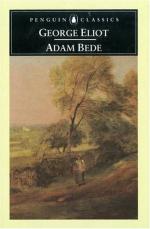|
This section contains 5,151 words (approx. 18 pages at 300 words per page) |

|
SOURCE: “Aristotle and George Eliot: Hamartia in Adam Bede,” in Hamartia: The Concept of Error in the Western Tradition, edited by Donald V. Stump, James A. Arieti, Lloyd Gerson, and Eleonore Stump, The Edwin Mellen Press, 1983, pp. 267-80.
In the following essay, Holtze examines Aristotelian tragic influences in Adam Bede and the errors or “hamartia” committed by Adam, Arthur, and Hetty.
In 1855 George Eliot wrote a review entitled “The Morality of Wilhelm Meister” in which she concludes:
... the tragedian may take for his subject the most hideous passions if they serve as the background for some divine deed of tenderness or heroism, and so the novelist may place before us every aspect of human life where there is some trait of love, or endurance, or helplessness to call forth our best sympathies.1
Eliot was defending the morality of Goethe's work at a time before she herself became a...
|
This section contains 5,151 words (approx. 18 pages at 300 words per page) |

|


